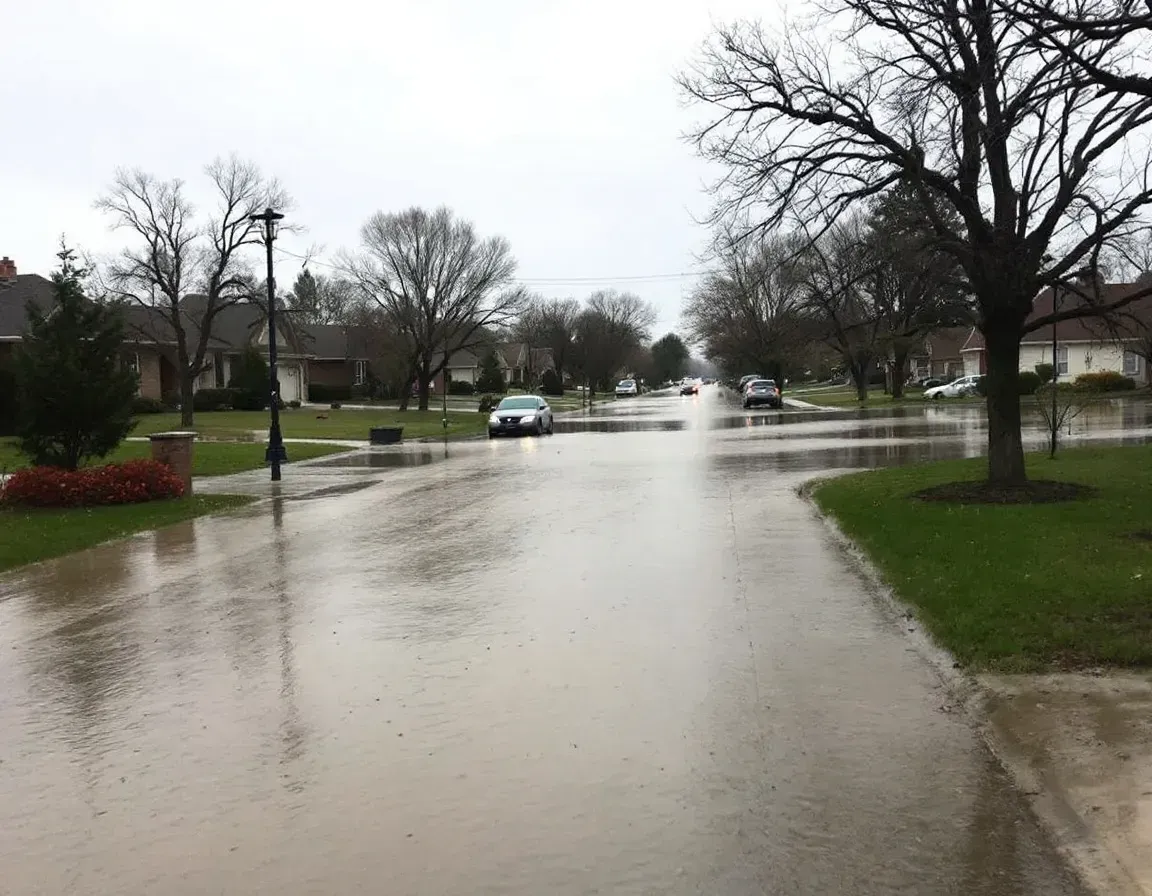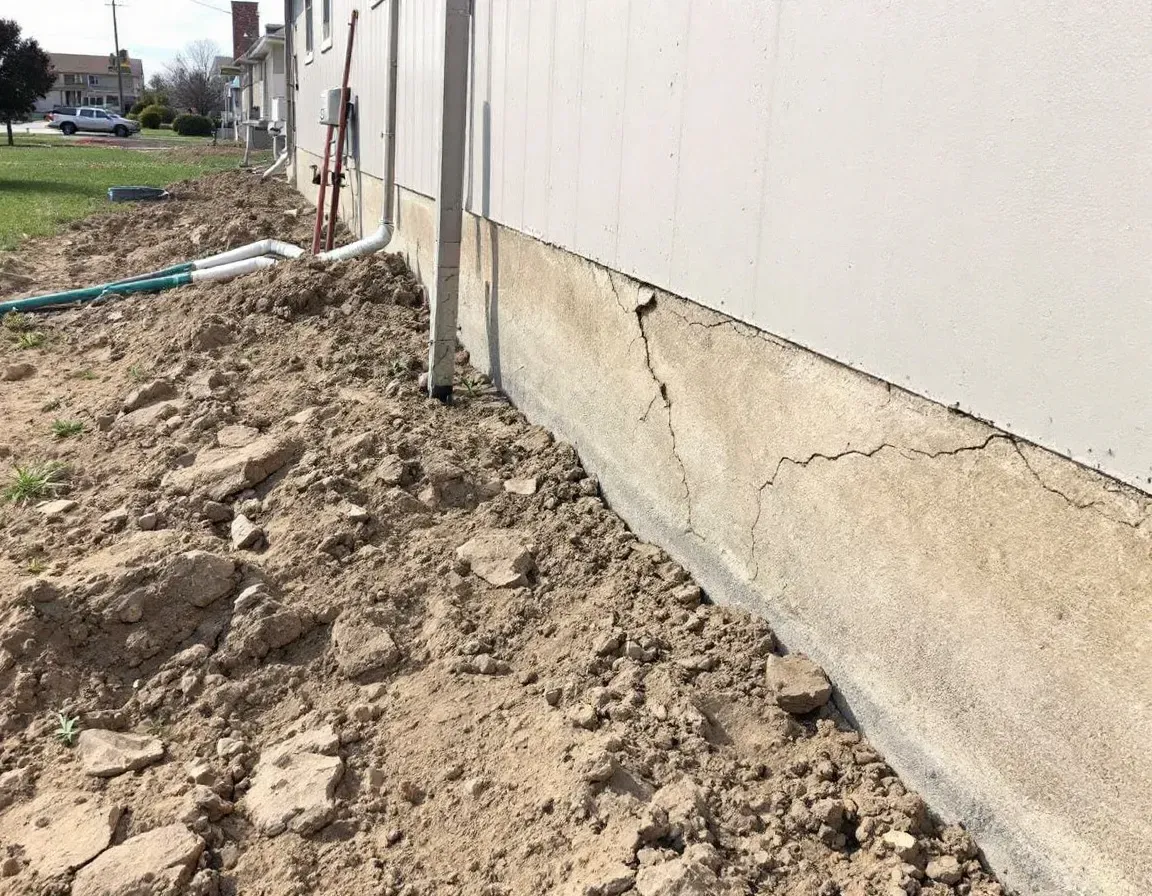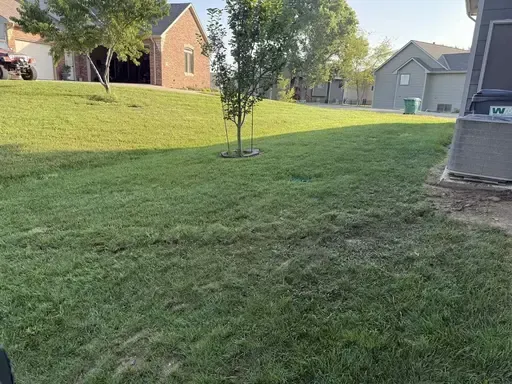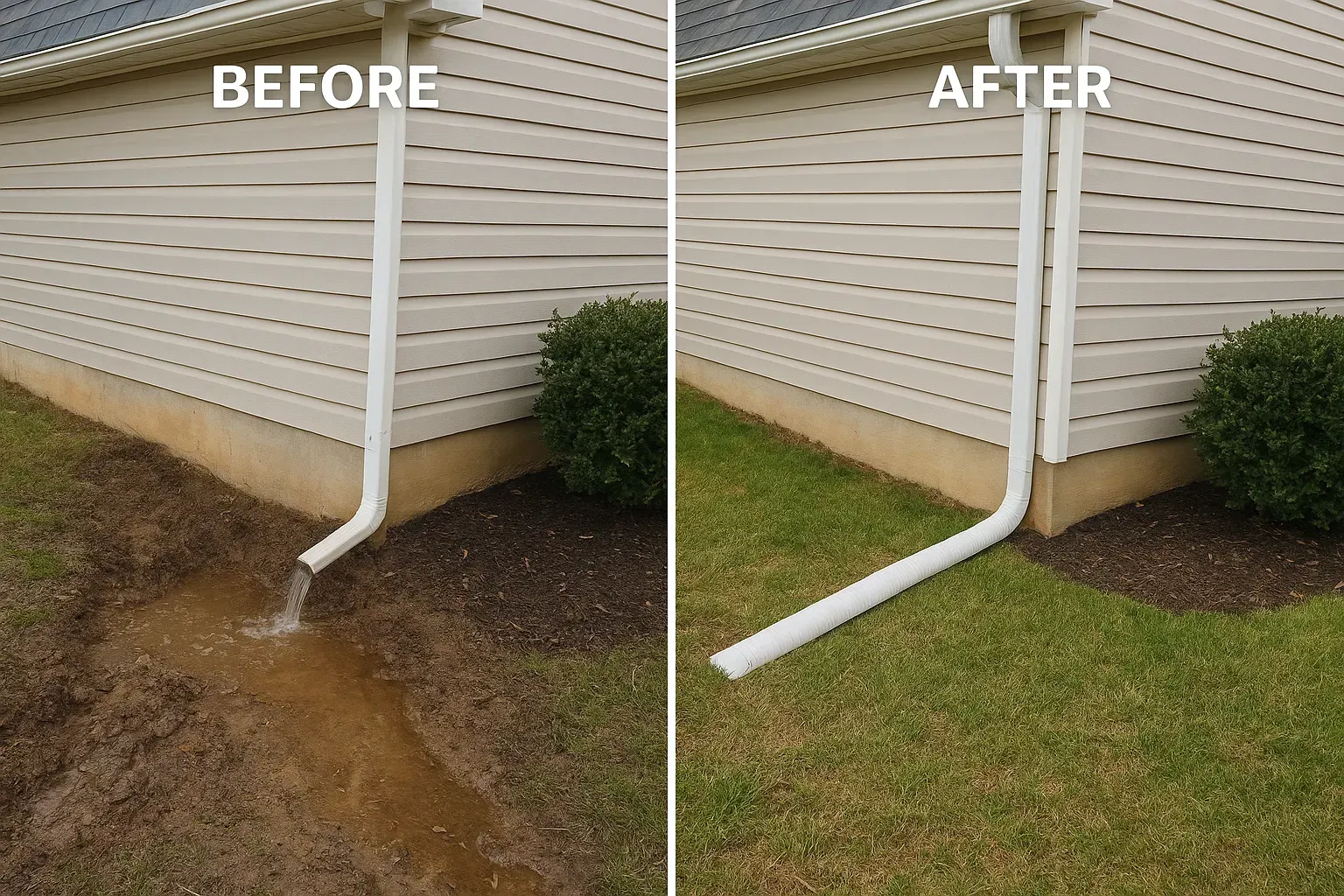French Drains vs. Gutter Extensions: What Works Best in Wichita?
This past June, people living on Bleckley Drive saw flooding they called "the worst ever." Heavy rains dumped 4 to 7 inches of water in just a few hours across Wichita. The city's storm drains couldn't keep up. For homeowners here, it was a scary wake-up call about how important good yard drainage really is.
Wichita has some tough drainage problems that other cities don't face. We sit in a river valley with clay soil that doesn't soak up water well. When it rains hard, water just sits on top of the ground. It pools around houses and can flood basements. Kansas weather doesn't help either, we get sudden storms that dump tons of rain fast.
Two main drainage solutions work well here: French drain systems and gutter downspout extensions. Both move water away from your house, but they work very differently. French drains handle underground water problems. Rain gutter extensions deal with water coming off your roof.
Picking the right one for your Wichita home can save you thousands in water damage. Let's look at which drainage solution works best for our clay soil and crazy Kansas weather.
[If you've made your choice, you can choose from our own services. French Drains in Wichita KS, or Downspout Services in Wichita. Or, choose from any of our Underground Drain Services in Wichita]

Understanding Wichita's Unique Drainage Challenges
The Clay Soil Problem
Wichita sits on some of the trickiest soil for drainage, thick clay that acts like a sponge. Our clay soil contains bentonite, which is great for sealing ponds but terrible for yard drainage. When it gets wet, this clay swells up. When it dries out, it shrinks and cracks. This constant expanding and shrinking causes big problems for homeowners.
The clay here doesn't let water soak through like sandy soil does. Instead, rain just sits on top, creating puddles around your house. Experts recommend making sure water slopes away from your house and having downspouts discharge five feet away from the foundation. The Arkansas River valley location makes it worse, we're sitting in a low spot where water naturally wants to collect.
When clay soil gets too wet or too dry, it can crack your foundation. It can also make basement waterproofing much harder. Many drainage solutions that work great in other states don't work well in our clay.
Weather Patterns That Impact Drainage
Kansas weather hits us with drainage challenges from every direction. Spring storm season (March through June) brings our heaviest rains. We can get several inches in just a few hours, overwhelming any drainage system that isn't built for clay soil conditions.
Our winters freeze and thaw repeatedly. This cycle can crack drainage pipes and make clay soil movement even worse. Summer droughts make the clay shrink and crack, which lets too much water rush to your foundation when storms finally come.

French Drains: Deep Solution for Persistent Problems
How French Drain Systems Work in Wichita Conditions
A French drain is like a hidden highway for water underground. It's a trench filled with gravel and a perforated drainage pipe that catches water before it reaches your foundation. In Wichita's clay soil, this subsurface drainage system works by giving water an easy path to follow instead of sitting around your house.
Installing French drains here means digging through tough clay, which takes more work than in sandy areas. The trench needs to go below the frost line, about 30 inches deep in Kansas, so winter freezing won't crack the drainage pipes. We use special gravel that won't get clogged by our clay, and the perforated pipe has holes that let water in but keep dirt out.
[Want to know more on how they work? Look at our French Drain services]
Best Applications in Wichita
French drain systems work great for basement drains when you have water coming up through your foundation. They're perfect for ranch-style homes (which most of Wichita has) that sit close to ground level. If your backyard drainage is terrible after storms, a French drain can fix that too.
These drainage solutions really shine in neighborhoods like Riverside and College Hill, where old homes deal with foundation drains that don't work anymore. If you have standing water problems that gutter downspout extensions can't fix, you probably need the deeper solution that French drains provide.
Pros and Cons for Wichita Homeowners
Pros:
- Handles our clay soil drainage problems really well
- Works great for basement waterproofing
- Deals with groundwater drainage that surface fixes can't touch
- Lasts 20-30 years when installed right
- Stops foundation problems before they start
Cons:
- Costs more upfront than gutter extenders
- Digging through clay soil is hard work and expensive
- Tree roots can clog the drainage pipes over time
- You might need permits from the city
- Takes longer to install than simple downspout drainage solutions
[Want a more in-depth insight? See our guide to
The Benefits of an Underground Drainage System]

Gutter Extensions: Surface-Level Water Management
How Extensions Address Wichita's Water Issues
Rain gutter extensions are the simple fix that moves water from your roof away from your house. These plastic gutter extensions or flexible downspout extensions attach to your downspouts and carry water 4-8 feet away from your foundation. In Wichita's clay soil, this surface drainage can prevent a lot of water problems before they start.
Roll out gutter extensions work great here because they're easy to move when you mow. Adjustable gutter extensions let you change the length based on how much rain we get. Some homeowners use gutter extensions with splash blocks to spread the water out even more. You can find these drainage extensions at Home Depot, Lowe's, or even Amazon.
Ideal Situations for Extensions
Gutter downspout extensions work best on newer homes that already have good foundation drainage. If your house sits higher than the street and has decent slope, downspout extenders might be all you need. They're perfect for quick fixes when you see water pooling near your foundation after storms.
These roof drainage extensions are great for ranch homes, garden drainage around flower beds, and RV gutter extensions for mobile homes. If your basement stays dry but you just want to protect your foundation, attachable gutter extensions are often enough.
Advantages and Limitations
Pros:
- Cheap and easy - best gutter extensions cost under $50
- DIY installation takes about 30 minutes
- No digging required in our tough clay soil
- Work with any downspout diverter system
- Easy to clean with basic gutter cleaning tools
- Can add gutter accessories like rain chains later
Cons:
- Only handle roof water, not yard drainage problems
- Don't work well in flat areas with poor slope
- Kansas storms can wash away lightweight extensions
- Need regular cleaning so they don't clog
- Won't fix basement flooding from groundwater
- Hidden gutter extensions cost more but look better

Cost Comparison: Installation and Long-Term Value
Initial Investment in Wichita Market
The price difference between these drainage solutions is huge. Rain gutter extensions are the clear winner for your wallet upfront. Basic downspout extensions cost $5 to $20 each, and you can install them yourself in about 30 minutes. Even the best gutter extensions with splash blocks will only run you $50-100 total.
French drain systems cost way more. In Wichita, French drain installation runs $2,430 to $3,800 for 100 feet. That's because digging through our clay soil is tough work. Professional installation costs $50 to $60 per linear foot, so a typical basement waterproofing job can hit $5,000-6,000.
You might need permits for French drains in Wichita, which adds to the cost. Gutter extenders don't need any permits - just buy them at Home Depot or Lowe's and attach them.
Long-Term Maintenance and ROI
Here's where French drains make up ground. They last 20-30 years with almost no maintenance. Gutter extensions need cleaning every few months and replacement every 5-10 years, especially with our harsh Kansas weather.
French drain systems can boost your home value by preventing foundation problems that cost thousands to fix. Insurance companies sometimes give discounts for good drainage too. Gutter downspout extensions are cheap to maintain but won't add much to your home's value.
For serious water problems, spending more upfront on French drains usually saves money long-term. For basic roof water management, gutter accessories like extensions work great.
Making the Right Choice for Your Wichita Home
Decision Factors Checklist
Choose gutter downspout extensions if:
- You just see water puddles near your foundation after storms
- Your basement stays dry most of the time
- You want a quick, cheap fix you can do yourself
- Your yard slopes away from your house pretty well
- You're dealing with a newer home with good foundation drainage
Go with French drain systems if:
- Water comes up in your basement or crawl space
- You have standing water in your yard that won't go away
- Your foundation has cracks from our clay soil moving
- Gutter extensions didn't solve your drainage problems
- You want a permanent fix for serious water issues
Most Wichita homeowners start with adjustable gutter extensions because they're so affordable. If that doesn't work after a few storms, then you know you need the deeper solution of subsurface drainage.
When to Consult Local Professionals
Call a drainage contractor if you see water in your basement, cracks in your foundation, or if your yard stays soggy for days after rain. Get quotes from at least three companies, and make sure they understand Wichita's clay soil challenges. Ask if they guarantee their work and what permits you'll need through the City of Wichita.
Conclusion
When it comes to protecting your Wichita home from water damage, you now know the key differences between gutter downspout extensions and French drain systems. Extensions work great for simple roof water problems and won't break your budget. French drains handle the serious stuff, basement flooding, yard drainage issues, and our tricky clay soil problems.
Most homeowners should start with adjustable gutter extensions since they're cheap and easy to try. If you still have water problems after a few big storms, that tells you it's time for the deeper fix that subsurface drainage provides.
Don't wait until you have expensive foundation damage or basement waterproofing emergencies. Wichita's clay soil and unpredictable weather won't get easier to deal with. Get a professional assessment if you're not sure which drainage solution fits your situation. Your home, and your wallet, will thank you for taking action before the next big storm hits.
Wichita Home Drainage Decision Checklist
See the checklist below to determine which is best for your home. You can also download this checklist on the bottom
If you decide on French Drains, see our French Drain services
For downspout extensions, see our Downspout services
🏠 Wichita Home Drainage Decision Checklist
French Drains vs. Gutter Extensions - Which Works Best for Your Home?
📋 Quick Assessment - Check All That Apply
💧 Your Water Problems:
🏡 Your Home & Property:
🔧 Current Situation:
💰 Budget & Timeline:
✅ Choose GUTTER EXTENSIONS if you checked mostly:
✓ Water puddles only after storms ✓ Basement stays dry ✓ Want to spend under $100
✓ Yard slopes away from house ✓ Need quick DIY solution
Best Options:- Adjustable gutter extensions ($15-25 each)
- Roll-out extensions with splash blocks ($30-50)
- Flexible downspout extensions ($10-20 each)
⚡ Choose FRENCH DRAINS if you checked mostly:
✓ Water in basement/crawl space ✓ Yard stays soggy for days
✓ Foundation cracks present ✓ Gutter extensions didn't work ✓ Want permanent solution
Expected Investment:- Professional installation: $2,400-3,800 for 100 feet
- Permits may be required (City of Wichita)
- Lasts 20-30 years with minimal maintenance
🎯 Smart Strategy for Most Homeowners:
- Start with gutter extensions(cheap and quick to try)
- Test through 2-3 major storms to see if they work
- Upgrade to French drains if water problems continue
🚨 Call a Professional Immediately If You Have:
- Water coming up through basement floor
- New cracks in your foundation
- Standing water for 3+ days after rain
- Musty smells or mold in basement
- Multiple failed attempts with extensions
❓ Questions to Ask Drainage Contractors
- Do you have experience with Wichita's clay soil?
- What permits do I need from City of Wichita?
- Do you guarantee your work and for how long?
- Can you show examples in my neighborhood?
- What's included in your price quote?
- How long will installation take?
🌪️ Wichita-Specific Challenges
- Expands and contracts with moisture
- Poor water absorption
- Causes foundation damage
- Heavy spring storms (March-June)
- Freeze-thaw cycles damage pipes
- Summer droughts crack clay soil
Keep this checklist handy when shopping for drainage solutions or talking to contractors!
© 2025 - Wichita Home Drainage Guide
